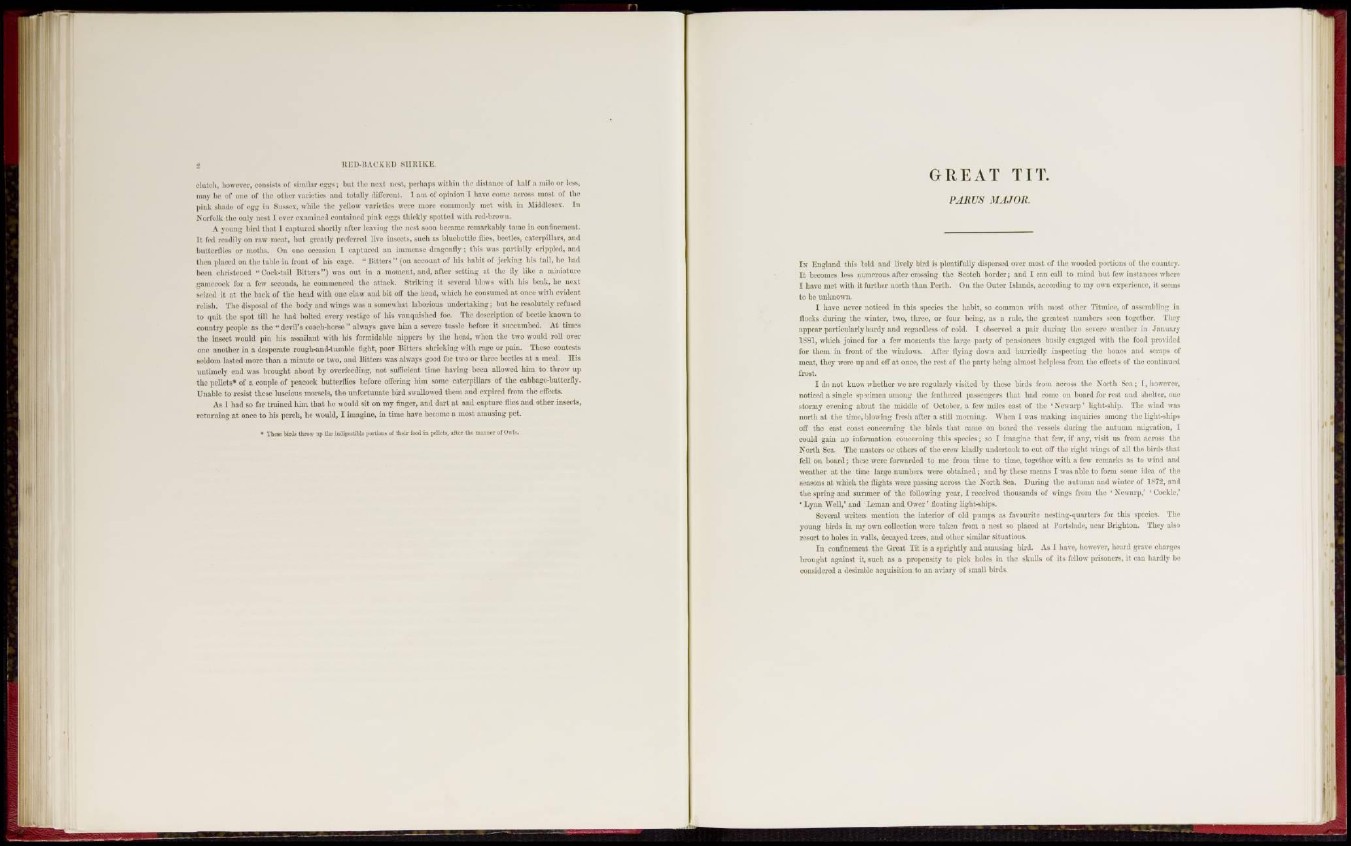
RED-BACKED SHRIKE.
clutch, however, consists nl' similar eggs; but tin1 next nest, perhaps ivitliiii tin' distance of hilf a mile or lent,
may be of OH »f the other w l t t t e e ami totally different. I am of opinion 1 hare oomc across most of the
pink shade of egg in Sussex, while the yellow varieties were more commonly met with in Middlesex. In
Norfolk the only nest I erer examined contained pink eggs thickly •potted with red-brown.
A young bird that 1 captured shortly after leaving the nest soon became remarkably tame in confinement
It fed readily on raw meat, hut greatly preferred live insects, such as bluebottle Hies, heetles, caterpillars, and
bnlierllies or mollis. On one occasion I captured an immense dragonfly; this was partially crippled, and
then placed on the table in front of his cage. " Hitters" (on account of his habit of jerking his tail, he had
been christened " Cock-tail Bitters") was out in a moment, and, after setting at the fly like a miniature
gamecock for a Tew seconds, he commenced the attack. Striking it several blows with his lieak, he next
seized it tit the hack of the head with one claw and hit off the head, which he consumed at once with evident
relish, 'the disposal of the body and wings was a soincw hat laborious undertaking ; but he resolutely refused
to quit the spot till he had hulled every vestige of his vanquished foe. The description of beetle known to
country people as the "devil's coach-horse" always gave him a severe tussle before it siicciimln'd. At times
the insect would pin his assailant with his formidable nippers by the head, when the two would roll over
one another in a desperate rough-and-tumble light, poor Bitters shrieking with rage or pain. These contests
seldom lasted more than a minute or Iwo, and Bitters was always good for two or three beetles at a meal. His
untimely end was brought about by overfeeding, not sullieioal lime haiiag been allowed him to throw up
the pellets* of a couple of peacock butterflies before ottering him some caterpillars of the cabbage-butterfly.
Unable to resist these luscious morsels, the unfortunate bird swallowed them and expired from the riTects.
As I had so fir trained him that he would sit on my tingiT, and dart at and capture flies and other insects,
returning at once to his perch, he would, I imagine, in lime have become a most amusing pet.
• These bitJj throw u[i thi' iiKligntibli: poruuiii of tlii-ir food in pellet*, ifUr the manner of Owl..
G R E A T TIT.
I'JRUS MAJOR.
Is- England this hold and lively bird is plentifully dispersed over most of the wooded portions of ihe country.
I t becomes less numerous after crossing the Scotch border; and I can call to mind hut few inslanccs where
1 have met with it further north than Perth. On the Outer Islands, according to my own experience, it seems
to be unknown.
I havo never noticed in this species the habit, so common with most other Titmice, or assembling in
flocks during the winter, two, three, or four being, as a rule, the greatest numliers seen together. They
appear particularly hardy and regardless of cold. I observed a pair during the severe weather in .lauuary
1881, which joined for a few moments the large parly of pensioners busily eagagiil with the food provided
for them in front of the windows. After living doiiii and hurriedly inspecting the hones ami scraps of
meat, they wore up and olf at once, the rest of the party being almost helpless from the cll'ects of the continued
I do not know whether we are regularly visited by these birds from across the North Bee; I, however,
noticed a single specimen among the feathered passengers that had come on board for rest and shelter, one
stormy evening about the middle of October, a few miles east of the ' N e u a r p ' light-ship. The wind was
north at the liiue, blow ing fresh after a stitl morning. When I was making inquiries among the light-ships
olf the cast coast concerning the birds that came on hoard the vessels during the autumn migration, 1
could gain no information concerning this species; so I imagine that few, ¡1' any, visit us from across the
North Sea. The masters or others of the crow kindly undertook to cut oil the right wings or all the birds that
fell on board; these were forwarded to me from time to time, together with a few remarks as to wind and
weather at the time largo numbers were obtained; and by these means I was able to form some idea of the
seasons at which the flights were passing across the North Sen. During the autumn and winter of and
the spring and summer of the following year, I received thousands of wings from Ihe ' Newiirp,' 'Cockle,'
1 Lynn Well*' and ' Lctnan and Ower' floating light-ships.
Several writers mention the interior of old pumps as favourite nesting-quarters for this species. The
young birds in my own collection were taken from a nest so panned at Portslade, near Brighton. They also
resort to holes in walls, di-cayed trees, and other similar situations.
I n confinement the Great Tit is a sprightly and amusing bird. As I have, however, heard grave charges
brought against it, such as a propensity to pick holes in the skulls of its fellow prisoners, it can hardly he
considered a desirable acquisition to an aviary of small birds.